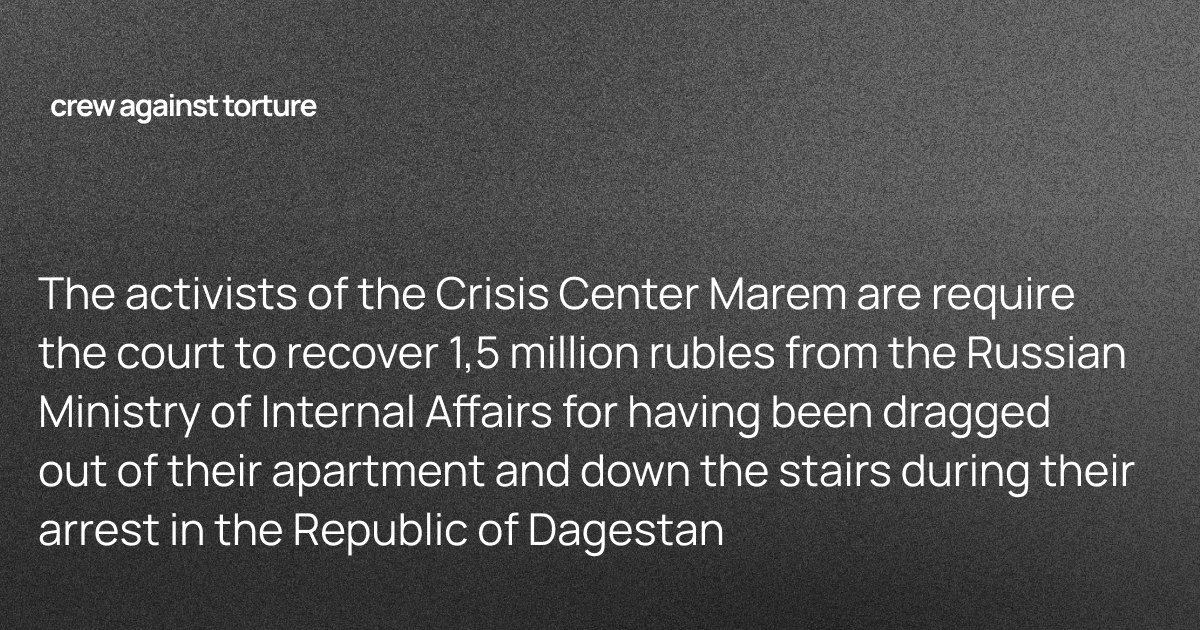НАСТОЯЩИЙ МАТЕРИАЛ (ИНФОРМАЦИЯ) ПРОИЗВЕДЕН, РАСПРОСТРАНЕН И (ИЛИ) НАПРАВЛЕН ИНОСТРАННЫМ АГЕНТОМ «КОМАНДА ПРОТИВ ПЫТОК» ЛИБО КАСАЕТСЯ ДЕЯТЕЛЬНОСТИ ИНОСТРАННОГО АГЕНТА «КОМАНДА ПРОТИВ ПЫТОК» | 18+
Maysarat Kilyaskhanova, Iraida Smirnova and Svetlana Amirova were injured when the policemen invaded the Center’s shelter in Makhachkala in June 2021. The women sheltered a fugitive from Chechnya in that apartment. The women recall that the police dragged them out of the premises and down the stairs. The police drew up protocols that the women resisted the arrest, but the court later decided that there had been no resistance. And yet, the policemen were never punished.
The Sovetskiy District Court of Makhachkala began its consideration of the relevant civil action. The claim was lodged by the lawyers in the interests of three employees of the Crisis Center Marem, who intend to recover more than 1,5 million rubles from the Ministry of Internal Affairs for the unlawful use of force and arrest. Svetlana Amirova recalls that, when the policemen burst into the apartment, she screamed that she had suffered a heart attack, but the police skipped it over.
Svetlana adds the following: «Three men carried me head down: one of them held me by my legs, two — by my arms. I was dropped twice — at first, I banged the back of my head on the step, then I banged my lower back on the step.»
The women were taken to the police station and single-type protocols were drawn up against them (disobedience to the lawful orders of the police, Part 1 of Article 19.3 of the Code of Administrative Offenses). However, the next day, the court discontinued the administrative proceedings based on those protocols due to the absence of an offense in the activists’ actions, as the policemen were unable to prove that the women had resisted the arrest.
After the incident, the victims went to the hospital, where doctors found numerous bruises on their bodies. The psychologist, who worked with the victims after that incident, noted that the women had a difficult moral state, and one of the victims needed a consultation with a psychiatrist.
Besides, Maysarat, Iraida and Svetlana lodged crime reports before the Investigative Committee, but subsequently, the authorities refused to open a criminal case against the officers. The investigator accepted the testimonies of the policemen who claimed that they had arrested the women for «pushing» the officers away from the shelter’s door without reason. One of the officers, Dalgat Vagabikhmayev, indicated that when leaving the building, the women «lay down on the steps and rolled down the stairs,» ignoring “demands and persuasion to calm down.”
The lawyers who represent the interests of Kilyaskhanova, Smirnova and Amirova in the court believe that the police violated the right to respect for home, carried out an unlawful arrest, and unreasonably used physical force, as the women did not offer any resistance. Maysarat seeks to recover 445,000 rubles from the Russian Ministry of Internal Affairs, Iraida — just over half a million and Svetlana — 630,000.
The court’s hearing is scheduled for the 4th of April. The judge, Israpil Magomedov, decided to involve the Dagestan Ministry of Internal Affairs, as well as the Russian Ministry of Finance, as co-defendants.
In 2023, the European Court awarded Maysarat, Iraida and Svetlana 26,000 euros to each of them as compensation related to the incident of June 2021.
The commentary of the head of the Crew Against Torture, Mr. Sergey Babinets: «In the Caucasus, we increasingly hear about violations of women’s rights. For instance, the police dragged Zarema Musayeva out of her house barefoot in winter and brought her from Nizhny Novgorod to Grozny. The сases of women fleeing domestic violence have increased — one can cite the stories of Khalimat Taramova, Seda Suleymanova and Marina Yandiyeva. In these stories, law enforcement agencies played a significant role; however, it’s extremely difficult to prove their unlawful actions in the Caucasus region. And yet, despite pressure and sabotage from investigators, human rights lawyers continue to work on these cases in the North Caucasus. I hope that in this case, the victims will be able to receive compensation for non-pecuniary damage and thereby at least slightly change the current destructive practice.»
